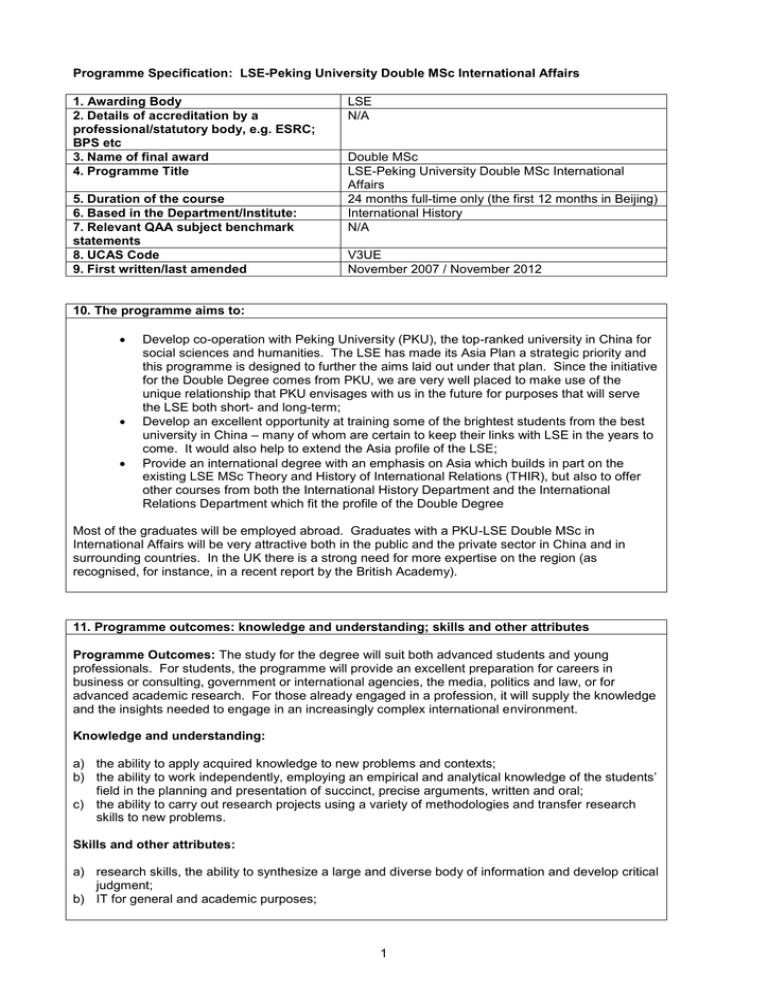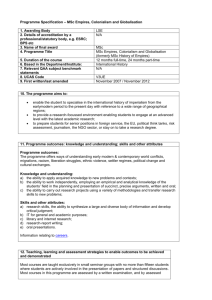LSE Programme Specification: LSE-Peking University Double MSc International Affairs
advertisement

Programme Specification: LSE-Peking University Double MSc International Affairs 1. Awarding Body 2. Details of accreditation by a professional/statutory body, e.g. ESRC; BPS etc 3. Name of final award 4. Programme Title 5. Duration of the course 6. Based in the Department/Institute: 7. Relevant QAA subject benchmark statements 8. UCAS Code 9. First written/last amended LSE N/A Double MSc LSE-Peking University Double MSc International Affairs 24 months full-time only (the first 12 months in Beijing) International History N/A V3UE November 2007 / November 2012 10. The programme aims to: Develop co-operation with Peking University (PKU), the top-ranked university in China for social sciences and humanities. The LSE has made its Asia Plan a strategic priority and this programme is designed to further the aims laid out under that plan. Since the initiative for the Double Degree comes from PKU, we are very well placed to make use of the unique relationship that PKU envisages with us in the future for purposes that will serve the LSE both short- and long-term; Develop an excellent opportunity at training some of the brightest students from the best university in China – many of whom are certain to keep their links with LSE in the years to come. It would also help to extend the Asia profile of the LSE; Provide an international degree with an emphasis on Asia which builds in part on the existing LSE MSc Theory and History of International Relations (THIR), but also to offer other courses from both the International History Department and the International Relations Department which fit the profile of the Double Degree Most of the graduates will be employed abroad. Graduates with a PKU-LSE Double MSc in International Affairs will be very attractive both in the public and the private sector in China and in surrounding countries. In the UK there is a strong need for more expertise on the region (as recognised, for instance, in a recent report by the British Academy). 11. Programme outcomes: knowledge and understanding; skills and other attributes Programme Outcomes: The study for the degree will suit both advanced students and young professionals. For students, the programme will provide an excellent preparation for careers in business or consulting, government or international agencies, the media, politics and law, or for advanced academic research. For those already engaged in a profession, it will supply the knowledge and the insights needed to engage in an increasingly complex international environment. Knowledge and understanding: a) the ability to apply acquired knowledge to new problems and contexts; b) the ability to work independently, employing an empirical and analytical knowledge of the students’ field in the planning and presentation of succinct, precise arguments, written and oral; c) the ability to carry out research projects using a variety of methodologies and transfer research skills to new problems. Skills and other attributes: a) research skills, the ability to synthesize a large and diverse body of information and develop critical judgment; b) IT for general and academic purposes; 1 c) library and internet research; d) research-report writing; e) oral presentations. Information relating to careers. 12. Teaching, learning and assessment strategies to enable outcomes to be achieved and demonstrated Most courses are taught exclusively in small seminar groups with no more than fifteen students. Most courses in this programme are assessed by a written examination, and by assessed coursework (in some courses).There is also a compulsory dissertation. Degrees are awarded to candidates who secure passes in all FOUR components of the degree. 13. Programme structures and requirements, levels, modules and awards See the LSE-PKU Double Degree in International Affairs Programme regulations Additional information 14. Criteria for admission to the programme Applicants should have at least an upper second class honours degree or its equivalent in any discipline. 15. Indicators of quality 1. On the RAE front, the indicators keep changing, of course, but we were ranked as following: in 2001, we were 5* (the top category and one of eight institutions in the UK to score highest); in 2008, we had 35% 4* (top category) and the second-highest staff submission rate, behind Cambridge. 2. On the History subject tables, the Complete University Guide ranks us No. 2 (2012), the Guardian University Guide ranks us No. 2 (2012). 16. Methods for evaluating and improving the quality and standard of teaching and learning The Departments holds a designated staff meeting at least once a year which is given over to matters concerning teaching and examining. In addition every course is reviewed when it has run for five years. Also the external examiners’ comments are discussed at the examination meetings. School mechanisms: regular staff appraisal and review; improvements in teaching technique by the Teaching and Learning Centre through observations, advice and further training; induction programme and mentoring scheme for new members of staff; support of Graduate Teaching Assistants (GTAs) by the lecturer responsible for a particular module, plus the GTA Forum and mentoring of new GTAs by more experienced GTAs; centrally administered questionnaires by the Teaching Quality Assurance and Review Office; an improved system for ensuring that External Examiners’ comments/recommendations are fed through to Departments and acted upon; the School’s Teaching Learning and Assessment Committee which regulates all aspects of teaching quality; 2 LSE’s Graduate Studies Sub-Committee which oversees all postgraduate programmes, ensures that significant changes to programmes and courses pass through a sequence of formal stages so that curricular changes are appropriate and compatible with other developments. 3
